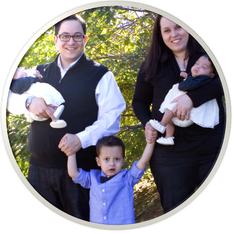Maria's Story

My husband and I were married in September 2006. We wanted children, but decided to wait a couple of years for what we thought would be the perfect time. In 2008, after months of trying, we were overjoyed when we found out we were pregnant. However, at just six weeks, I was diagnosed with a uterine abnormality; a congenital condition often associated with recurrent pregnancy loss and preterm labor (among other complications). At our 10-week ultrasound we were devastated to learn that we had lost our first baby.
Over the next year+, I underwent two uterine surgeries to correct the abnormality, experienced another miscarriage, and per our doctor's advice opted for fertility treatments to increase our chances of a healthy pregnancy.
We got pregnant in early 2009 and at 15 weeks I was diagnosed with yet another rare and dangerous condition (succenturiate placenta and vasa previa). The baby's placenta was in two pieces connected by fragile fetal vessels, which if ruptured, could be fatal. In November 2009, after receiving surfactant to mature his lungs, we were blessed with a healthy baby boy, Nico Alexander, delivered via scheduled c-section at 37 1/2 weeks.
When it came time to try for another child, our doctor recommended doing "what worked the last time." This time we were blessed with twins! Again at just 15 weeks, our Perinatologist told me that my cervix was funneling and shortening, indicating a very high probability of miscarriage or preterm labor. I was put on very strict bed rest until 23 weeks and 6 days when I thought my water broke, but it was blood, and a lot of it! I was rushed to Bryn Mawr Hospital via ambulance. Doctors suspected a placental abruption. I spent 1 week 1 day in the hospital with continuous bleeding and contractions. Doctors again gave me surfactant to mature the babies' lungs. The Neonatologist came to visit a few times to talk to my husband and I about the risks, survival rates and ultimately needed us to tell him what resuscitation measures should be taken in certain situations since we were on the threshold of viability. Each day, the babies' odds improved but there was no question that the probability of serious complications was very high. Despite all the risks, we wanted doctors to do whatever they could to save our girls.
At 25 weeks and 1 day, after another huge bleed and more contractions, I started dilating. Thirty minutes later, Maci Nicole and Mia Victoria were delivered via emergency c-section. They each weighed 1 lb. 11 oz. and were about 13 inches long.
I remember hearing Maci cry, but there were no sounds from Mia. I couldn't see anything, but I could hear the teams working hard to stabilize both girls as I lay there on the table being (physically) put back together. I didn't know it at the time, but my little baby Mia was not breathing, was bradycardic, and being resuscitated. All I knew was that they were having difficulty stabilizing her and eventually got her intubated. We had no idea if our precious girls would make it past delivery and I couldn't even see them.
The moments that followed are pretty blurry, but I do clearly remember the nurses wheeling my bed into the NICU and letting me put my hand in each isolette so I could see and touch my girls for the first time. Mia's paper-thin skin was black and swollen on one side of her body due to severe bruising and her eyes were still fused shut (and remained that way for her first 11 days). Both girls were on mechanical ventilators and being kept alive by machines with tons of wires and tubes connected to their fragile little bodies.
This was the scariest day of our lives. Our twins were given a 10% chance of survival, as well as a long list of other scary potential complications. The next day I asked the Neonatologist about survival percentages and if they had improved. What he told me that day really changed our whole perspective. Our daughters had either a 0% or 100% chance of survival and none of the numbers in between meant anything. From that moment we prayed like never before and forgot about the odds. Our girls were going to survive.
Leaving the hospital without our baby girls was so incredibly difficult, but we knew that they were where they needed to be. The NICU became a second home, and the NICU team, like an extended family. They helped us to understand that we really had to take things a day at a time. We couldn't plan or worry about tomorrow, or next week because no one knew what was going to happen. We had to live in the moment, pray for the best and do everything we could to help our little babies fight for their lives. The doctors and nurses helped us to celebrate the tiniest milestones and spent hours talking us through the scary times too.
The early weeks were the most difficult. Little Maci and Mia kept their nurses jumping and developed a bit of a reputation for it too! There were scares with infections, problems digesting their tube feedings, distended bellies from being pumped with so much oxygen, stage 1 ROP, Mia's PDA (not knowing if she would need surgery) and countless apnea and bradycardia events that almost stopped my heart a few times. I still remember the first really bad event I experienced where Mia stopped breathing and went limp while I was holding her little hand. This happened to both girls because their lungs were not developed and their brains were not mature enough to remind them to keep breathing. Mia had the toughest time and was intubated 8 times over a 5-week period, some of which were due to her pulling the tube out herself!
Maci Nicole spent 88 days in the NICU and came home around 37 1/2 weeks. Mia Victoria stayed past her due date, for a total of 113 days, and came home on lots of medication, due to the open valve in her heart (PDA). Both girls were on apnea and bradycardia monitors until they were 8 months old. In the months and years that followed, the girls benefited from early intervention therapy services including OT, PT, feeding, special instruction / speech and early on were followed by the NICU's Developmental Specialist. We continued that therapy until Kindergarten. Maci has also had vision therapy and outpatient PT at CHOP for low muscle tone and joint laxity.
Spending almost 4 months in the NICU has had such a big impact on my life and that of my family. Although our journey was not easy, we realize that our girls were extremely lucky. We could not have gotten through it without the support and prayers of our family, friends and especially the amazing Bryn Mawr Hospital NICU Team. They saved our daughters' lives and the gratitude we feel cannot be put into words. This experience inspired me to help other families travelling a similar journey through the NICU. When you have a baby or babies in the NICU, your whole world is turned upside-down. Our care packages are prepared with love from one NICU family to another, to provide comfort, let them know that they are not alone and to help promote the bond between parents and their babies.
I am honored to be a part of the Project Sweet Peas team and the Division Coordinator for the Greater Philadelphia Area.
Over the next year+, I underwent two uterine surgeries to correct the abnormality, experienced another miscarriage, and per our doctor's advice opted for fertility treatments to increase our chances of a healthy pregnancy.
We got pregnant in early 2009 and at 15 weeks I was diagnosed with yet another rare and dangerous condition (succenturiate placenta and vasa previa). The baby's placenta was in two pieces connected by fragile fetal vessels, which if ruptured, could be fatal. In November 2009, after receiving surfactant to mature his lungs, we were blessed with a healthy baby boy, Nico Alexander, delivered via scheduled c-section at 37 1/2 weeks.
When it came time to try for another child, our doctor recommended doing "what worked the last time." This time we were blessed with twins! Again at just 15 weeks, our Perinatologist told me that my cervix was funneling and shortening, indicating a very high probability of miscarriage or preterm labor. I was put on very strict bed rest until 23 weeks and 6 days when I thought my water broke, but it was blood, and a lot of it! I was rushed to Bryn Mawr Hospital via ambulance. Doctors suspected a placental abruption. I spent 1 week 1 day in the hospital with continuous bleeding and contractions. Doctors again gave me surfactant to mature the babies' lungs. The Neonatologist came to visit a few times to talk to my husband and I about the risks, survival rates and ultimately needed us to tell him what resuscitation measures should be taken in certain situations since we were on the threshold of viability. Each day, the babies' odds improved but there was no question that the probability of serious complications was very high. Despite all the risks, we wanted doctors to do whatever they could to save our girls.
At 25 weeks and 1 day, after another huge bleed and more contractions, I started dilating. Thirty minutes later, Maci Nicole and Mia Victoria were delivered via emergency c-section. They each weighed 1 lb. 11 oz. and were about 13 inches long.
I remember hearing Maci cry, but there were no sounds from Mia. I couldn't see anything, but I could hear the teams working hard to stabilize both girls as I lay there on the table being (physically) put back together. I didn't know it at the time, but my little baby Mia was not breathing, was bradycardic, and being resuscitated. All I knew was that they were having difficulty stabilizing her and eventually got her intubated. We had no idea if our precious girls would make it past delivery and I couldn't even see them.
The moments that followed are pretty blurry, but I do clearly remember the nurses wheeling my bed into the NICU and letting me put my hand in each isolette so I could see and touch my girls for the first time. Mia's paper-thin skin was black and swollen on one side of her body due to severe bruising and her eyes were still fused shut (and remained that way for her first 11 days). Both girls were on mechanical ventilators and being kept alive by machines with tons of wires and tubes connected to their fragile little bodies.
This was the scariest day of our lives. Our twins were given a 10% chance of survival, as well as a long list of other scary potential complications. The next day I asked the Neonatologist about survival percentages and if they had improved. What he told me that day really changed our whole perspective. Our daughters had either a 0% or 100% chance of survival and none of the numbers in between meant anything. From that moment we prayed like never before and forgot about the odds. Our girls were going to survive.
Leaving the hospital without our baby girls was so incredibly difficult, but we knew that they were where they needed to be. The NICU became a second home, and the NICU team, like an extended family. They helped us to understand that we really had to take things a day at a time. We couldn't plan or worry about tomorrow, or next week because no one knew what was going to happen. We had to live in the moment, pray for the best and do everything we could to help our little babies fight for their lives. The doctors and nurses helped us to celebrate the tiniest milestones and spent hours talking us through the scary times too.
The early weeks were the most difficult. Little Maci and Mia kept their nurses jumping and developed a bit of a reputation for it too! There were scares with infections, problems digesting their tube feedings, distended bellies from being pumped with so much oxygen, stage 1 ROP, Mia's PDA (not knowing if she would need surgery) and countless apnea and bradycardia events that almost stopped my heart a few times. I still remember the first really bad event I experienced where Mia stopped breathing and went limp while I was holding her little hand. This happened to both girls because their lungs were not developed and their brains were not mature enough to remind them to keep breathing. Mia had the toughest time and was intubated 8 times over a 5-week period, some of which were due to her pulling the tube out herself!
Maci Nicole spent 88 days in the NICU and came home around 37 1/2 weeks. Mia Victoria stayed past her due date, for a total of 113 days, and came home on lots of medication, due to the open valve in her heart (PDA). Both girls were on apnea and bradycardia monitors until they were 8 months old. In the months and years that followed, the girls benefited from early intervention therapy services including OT, PT, feeding, special instruction / speech and early on were followed by the NICU's Developmental Specialist. We continued that therapy until Kindergarten. Maci has also had vision therapy and outpatient PT at CHOP for low muscle tone and joint laxity.
Spending almost 4 months in the NICU has had such a big impact on my life and that of my family. Although our journey was not easy, we realize that our girls were extremely lucky. We could not have gotten through it without the support and prayers of our family, friends and especially the amazing Bryn Mawr Hospital NICU Team. They saved our daughters' lives and the gratitude we feel cannot be put into words. This experience inspired me to help other families travelling a similar journey through the NICU. When you have a baby or babies in the NICU, your whole world is turned upside-down. Our care packages are prepared with love from one NICU family to another, to provide comfort, let them know that they are not alone and to help promote the bond between parents and their babies.
I am honored to be a part of the Project Sweet Peas team and the Division Coordinator for the Greater Philadelphia Area.

